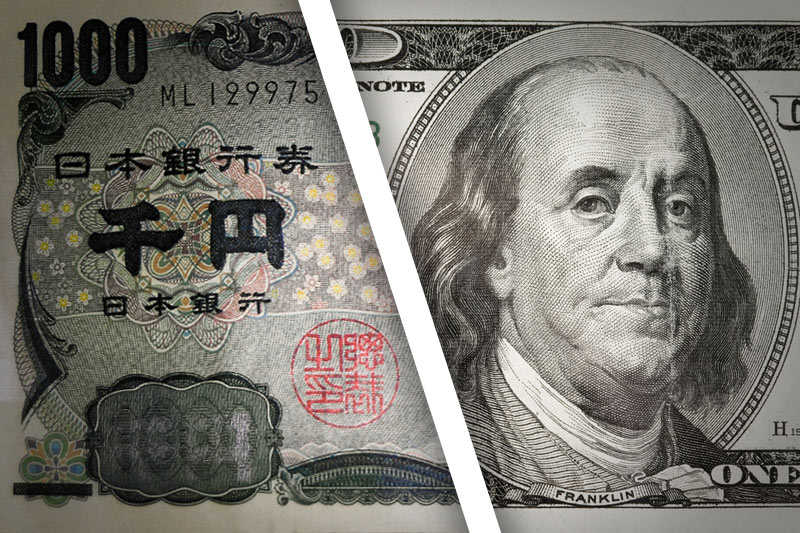Investing.com - The dollar shot up against the yen on Thursday after investors looked past the Federal Reserve's decision to leave stimulus programs unchanged and went long on the U.S. currency after a string of solid economic indicators hit the wire.
In U.S. trading on Thursday, USD/JPY was trading at 99.23, up 1.32%, up from a session low of 97.89 and off a high of 99.62.
The pair was likely to find support at 97.77, Wednesday's low, and resistance at 99.97, Friday's high.
The Federal Reserve on Wednesday concluded a two-day monetary policy meeting and made no changes to its USD85 billion bond-buying program, which weakens the dollar to spur recovery.
Many market participants were expecting the U.S. central bank to trim the total by USD10 billion or more now that the economy is gaining steam, though the Fed said it wanted to see more evidence that recovery will be sustained before adjusting the pace of its purchases.
Many investors felt that evidence became apparent on Thursday in the form of improving factory and labor-market reports.
The Federal Reserve Bank of Philadelphia said its Philly Fed manufacturing index rose to a 30-month high of 22.3 in September from 9.3 in August, blowing past expectations for an increase to 10.0.
Industry data revealed that U.S. existing home sales rose 1.7% to 5.48 million units last month, from 5.39 million in July. Analysts were expecting existing home sales to fall 2.6% to 5.25 million in August.
Also on Thursday, the Department of Labor reported that the number of individuals filing for initial jobless claims in the U.S. rose by 15,000 to a seasonally adjusted 309,000 in the week ending Sept. 14, from an upwardly revised 294,000 the previous week.
Analysts were expecting the number to rise by 36,000 to 330,000 last week.
Elsewhere, the U.S. current account deficit narrowed to USD98.9 billion in the second quarter, from an downwardly revised deficit of USD104.9 billion in the three months to March. Analysts were expecting the current account deficit to narrow to a USD97 billion.
The yen came under pressure against most currencies after Bank of Japan Board Member Takahide Kiuchi said the central bank may expand its easing programs.
The yen, meanwhile, was down against the pound and down against the euro, with GBP/JPY up 0.61% and trading at 159.11 and EUR/JPY trading up 1.36% at 134.24.
In U.S. trading on Thursday, USD/JPY was trading at 99.23, up 1.32%, up from a session low of 97.89 and off a high of 99.62.
The pair was likely to find support at 97.77, Wednesday's low, and resistance at 99.97, Friday's high.
The Federal Reserve on Wednesday concluded a two-day monetary policy meeting and made no changes to its USD85 billion bond-buying program, which weakens the dollar to spur recovery.
Many market participants were expecting the U.S. central bank to trim the total by USD10 billion or more now that the economy is gaining steam, though the Fed said it wanted to see more evidence that recovery will be sustained before adjusting the pace of its purchases.
Many investors felt that evidence became apparent on Thursday in the form of improving factory and labor-market reports.
The Federal Reserve Bank of Philadelphia said its Philly Fed manufacturing index rose to a 30-month high of 22.3 in September from 9.3 in August, blowing past expectations for an increase to 10.0.
Industry data revealed that U.S. existing home sales rose 1.7% to 5.48 million units last month, from 5.39 million in July. Analysts were expecting existing home sales to fall 2.6% to 5.25 million in August.
Also on Thursday, the Department of Labor reported that the number of individuals filing for initial jobless claims in the U.S. rose by 15,000 to a seasonally adjusted 309,000 in the week ending Sept. 14, from an upwardly revised 294,000 the previous week.
Analysts were expecting the number to rise by 36,000 to 330,000 last week.
Elsewhere, the U.S. current account deficit narrowed to USD98.9 billion in the second quarter, from an downwardly revised deficit of USD104.9 billion in the three months to March. Analysts were expecting the current account deficit to narrow to a USD97 billion.
The yen came under pressure against most currencies after Bank of Japan Board Member Takahide Kiuchi said the central bank may expand its easing programs.
The yen, meanwhile, was down against the pound and down against the euro, with GBP/JPY up 0.61% and trading at 159.11 and EUR/JPY trading up 1.36% at 134.24.
